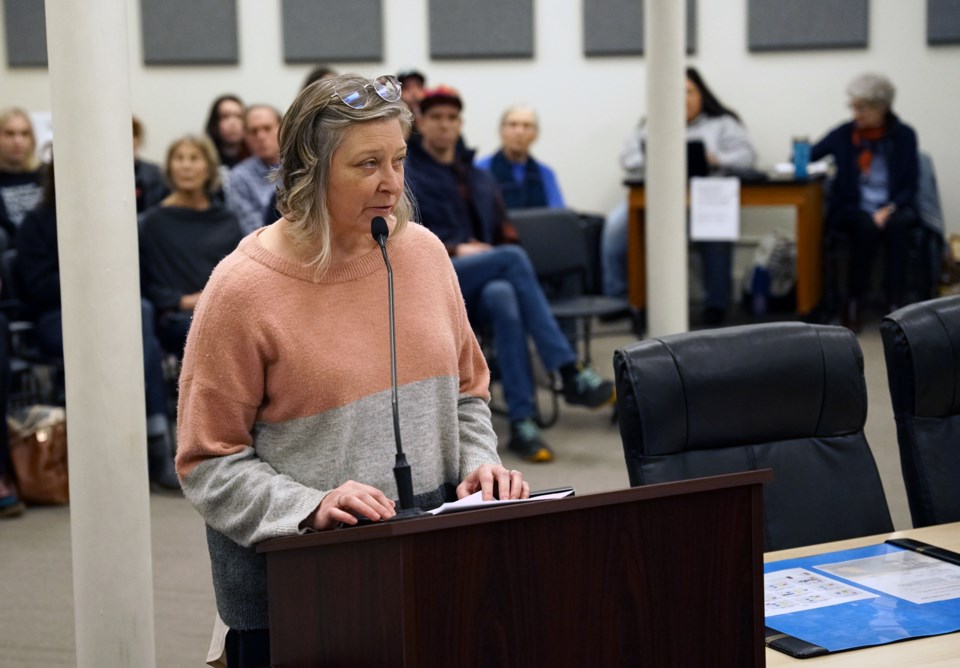City of Powell River councillors were provided an overview of community wants related to strategic priorities during a delegation to a recent meeting.
At the January 30 committee of the whole, Lisa Moffatt said according to the housing needs assessment and housing implementation plan, 60 per cent of all households in the city need more housing and more affordable housing.
“More than one in four rental households in the city live in housing that needs major repairs, more bedrooms, and/or it’s too expensive,” said Moffatt. “The city needs 770 new units of housing in the next five years and 77 per cent of them need to be affordable for low, very low and moderate-income households. The city needs to be working with existing developers to build here and attracting developers to meet these needs.”
Moffatt said there are three key decision points for housing authorities, which include the ability to successfully initiate a housing authority, so is the town in a good position to do so? She said in researching the matter, she learned that one of the major success factors is having land, and/or money.
“We know, through your budget deliberations, that the city doesn’t have a lot of money, and that the city has significant land holdings, which can be used for long-term leases, long-term rental income, et cetera, to ensure a stable income for the city over a number of decades,” said Moffatt.
She said the level of affordability is another key factor. She asked what type of housing a housing authority is going to include in its mandate. Will it be social housing, low market housing or market housing? she asked.
“What is the role the city will take in developing housing through the authority?” asked Moffatt. “Most authorities develop and manage, so you’ll need to attract the expertise to do so. You will specifically need the development experience so that you can get mortgages.
“The city doesn’t have current development experiences so it won’t qualify for mortgages. You may need to partner with developers until you have enough experience delivering housing through the authority.”
Moffatt said property investment can yield substantial financial returns.
Over the holidays she said she met some people in the community, such as medical professionals, physiotherapists and dentists, who are desperate to attract talent. They cannot attract talent because there is no available housing for their prospective employees, she added.
Moffatt then spoke about the complexity of social needs and why a social planner is needed. She said the social planner is the liaison and coordinator to strengthen relationships in support of the social needs of the community. She said previously, residents have been told these responsibilities are meant to be embedded in every staff member’s work.
“I want to recognize the training and skills needed for the job,” said Moffatt. “They include cultural competency, trauma informed approaches, conflict resolution and understanding of the complex socioeconomic, cultural, political and spiritual matters associated with a diverse community. These are special skill sets not likely held by all staff members.”
Moffatt said the 2016 social plan for the city covers housing, income, food, health and well-being, arts, cultural and heritage and social cohesion.
“The regional planner position was the recommendation from this plan and was implemented, and as we know, it’s been vacant for 18 months,” said Moffatt. “Having one person, or a small group of people responsible for connecting all the services across the region, is the key to successfully seeing people thrive.”
Moffatt said regarding reconciliation and potential name change, she is supportive of the city hiring an intergovernmental manager. She said the name change will happen one day, so why is the city waiting?
“Both residents of the city and Tla’amin Nation have the right to live in peace and security,” said Moffatt. “That means not being subjected to trauma because of the name of a place. Changing the name of the city is an important part of the relationship with Tla’amin Nation.”
Join the Peak's email list for the top headlines right in your inbox Monday to Friday.



